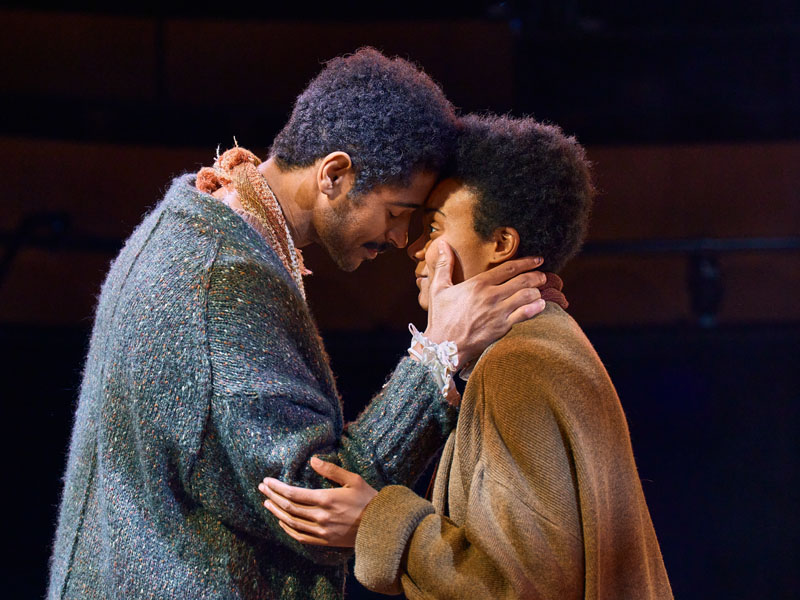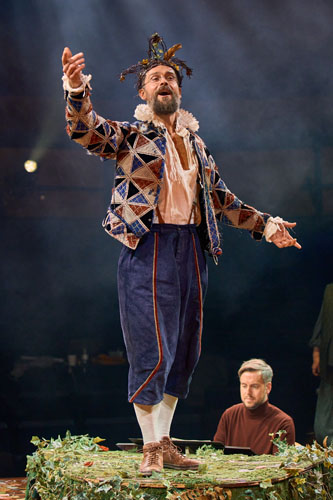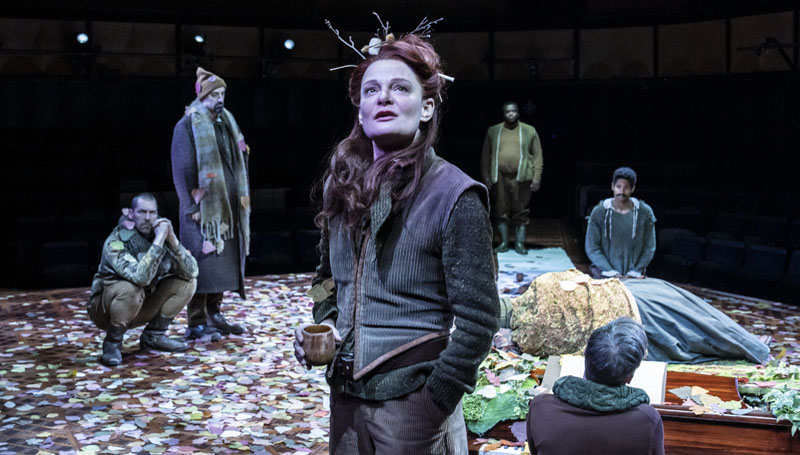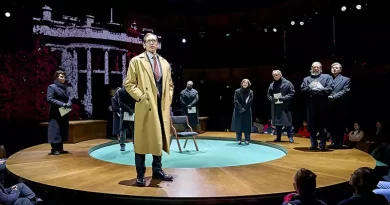“As You Like It” – @sohoplace, London
Neil Dowden in the West End
19th December 2022
The first in-house production @sohoplace is an engaging, innovative, and inclusive account of As You Like It that brings warmth to the winter season. Josie Rourke’s diverse cast – which includes deaf, transgender, and non-binary actors – bring sparkle to Shakespeare’s evergreen romantic comedy, while also conveying its melancholic strain. There is some cross-gender casting too, appropriate for a work that has fun with gender-role-playing and where courtiers are released from their inhibitions in the fairy-tale Forest of Arden. Performed in-the-round, the show puts music literally centre stage with a piano/pianist very much part of the action in a play that features more songs than any other by Shakespeare.

Rose Ayling-Ellis and Leah Harvey.
Photo credit: Johan Persson.
Indeed, composer/pianist Michael Bruce is the first to take to the stage, humorously playing some notes that are then played automatically before the ensemble gather in full Elizabethan court costume. To piano accompaniment, a red-haired, Queen Bess-like Martha Plimpton (who later plays the malcontent Jaques) sings the sombre “Blow, blow, thou winter wind …” (taken from Act II), setting the tone for the fraternal conflict that lies at the hub of the corrupt court.
Later on, the song “Under the Greenwood Tree” evokes a Robin Hood-style pastoral idyll in the Forest of Arden. Here, the piano is covered with greenery where it is used to hide under and climb on. Not only does Bruce interact with the other performers, but characters sometimes prompt him to play a tune in keeping with the mood they want to express in a particular scene, adding to the show’s irresistible feeling of spontaneity.
Robert Jones’s simple but elegant design features a parquet floor and chandeliers, with a giant gilt picture frame filled with bare branches suspended above the stage, through which multi-coloured leaves fall as the scene changes from town to country. Rourke manages this transformation beautifully as Duke Frederick removes his ruff to become his exiled older brother Duke Senior (Tom Edden neatly contrasting repressive and laid-back personas). Formal court dress gives way to looser, rustic wool garments, with actors doubling in both settings, providing an echoing effect.

Alfred Enoch and Leah Harvey.
Photo credit: Manuel Harlan.
Four screens displaying text are cleverly integrated into the scenography, including giving the sense that Orlando’s love poems to Rosalind are attached to trees. Rourke has made the decision to use surtitles throughout the play – not just for scenes involving sign language (which would probably be intrusive). Again, the signing is used to good dramatic effect. Deaf actor Rose Ayling-Ellis mainly uses a highly expressive British Sign Language for Celia’s interchanges with her friends Rosalind and Touchstone (who reciprocate), but not with her intransigent father Duke Frederick who refuses to acknowledge her disability – so her urgent spoken plea to him not to banish Rosalind carries a particular poignancy. As the bold shepherdess Audrey, Gabriella Leon seamlessly uses both voice and signing for her dialogue.
In some ways, Ayling-Ellis (until recently in EastEnders and 2021 winner of Strictly Come Dancing, which also won her the BAFTA TV Moment of the Year for her “silent” dance) provides the emotional heart of the show – as well as much positive energy – as Celia, with her tender attachment to her cousin Rosalind leading her to feel bereft when the latter gets together with Orlando.
Celia’s down-to-earth humour is nicely contrasted with the more headstrong, romantic Rosalind, attractively performed with quicksilver playfulness by Leah Harvey (recently seen at Theatre Royal Stratford East in Anthony Neilson’s The Wonderful World of Dissocia). They combine the right mixture of sentiment and comedy in the guise of the laddish Ganymede in their gender-bending “love tutoring” of the shy, bookish Orlando, here for once given good value in Alfred Enoch’s charmingly gentle and funny performance.
Plimpton also does well as the solitary, philosophical, female Jaques who casts a jaundiced eye over human affairs – the “Seven Ages of Man” speech is delivered with affecting naturalness, the end synchronized with the death of Orlando’s faithful servant Adam (played by June Watson). However, the suggestion that she is romantically attracted to the court jester Touchstone doesn’t work. Tom Mison makes the latter more likeable than usual, as his court snobbery and manipulation is played down, with him taking the lead in wanting to marry Audrey. Mary Malone also amuses as shepherdess Phoebe, eventually reluctantly giving up on Ganymede when “revealed” as Rosalind in a deliberately understated denouement that suggests identity comes from within.
The ending seems a bit rushed – the reunion between Rosalind and her father Duke Senior makes virtually no impact, while Celia’s betrothal to Orlando’s reformed brother Oliver (Ben Wiggins) is abrupt. But these are minor blemishes in an accessible, feel-good show whose creativeness should ensure that audiences like it.

Tom Mison as Touchstone.
Photo credit: Manuel Harlan.









